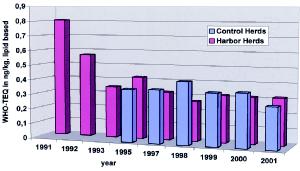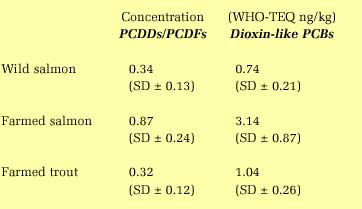| 2002 |

|
YEAR BOOK |
FOOD SAFETY AUTHORITY OF IRELAND
|
Looking at dioxin levels in Irish food
|

The European Union (EU) has recently established maximum limits for dioxins in animal feed and in several human foodstuffs, applicable from 1 July, 2002. For example, the maximum limit for milk and milk products is 3 picograms (pg) WHO-PCDD/PCDF-TEQ 1 /gram (g) milk fat and for fish is 4 nanograms (ng) TEQ/kg wet weight fish. Against this background, the Food Safety Authority of Ireland (FSAI) and other bodies in Ireland have examined levels of dioxins in a number of foodstuffs in recent years.
Studies of dioxins in cow�s milk have been carried out by the Environmental Protection Agency (EPA) in 1995 and 2000 and by FSAI/Cork County Council (FSAI/CCC) in 2002. The EPA sampled milks in �background� areas covering the entire country and in areas of perceived potential risk, and in their 2000 survey found dioxin levels (PCDDs and PCDFs) ranging from 0.11�0.41 pg TEQ/g milk fat for background samples and 0.12�0.38 pg TEQ/g fat in samples from areas of perceived risk, with a mean of 0.24 pg TEQ/g for both types of sample. These results were approximately 16% lower than the levels found in 1995. The downward trend in dioxin levels from 1995 to 2000 has been confirmed by the FSAI/CCC study of milks taken over a 10 year period from control herds and from herds in the Cork Harbour area. Mean levels of dioxins in milk from herds in the Harbour area declined from 0.81 pg TEQ/g fat in 1991 to 0.31 in 2001 (see Figure). Levels in milk from control herds ranged from 0.28 to 0.42 pg TEQ/g fat over the period 1995 to 2001.
1 The abbreviation �WHO-PCDD/PCDF-TEQ� refers to the toxic equivalence factors (TEF) established for a range of PCDDs and PCDFs by the World Health Organization (WHO). These TEQs represent the relative toxicity of the compound being measured to the toxicity of the most toxic compound, tetrachlorodibenzo-p-dioxin (TCDD). WHO TEQs have also been established for the dioxin-like PCBs. In this article, �WHO-PCDD/PCDF-TEQ� has been further abbreviated to TEQ/g (fat) or TEQ/kg (wet weight, for fish), as appropriate.
Both the 2000 EPA study and the FSAI/CCC study also analysed dioxin-like PCBs in milk, levels of which were essentially similar to those for the dioxins. The mean Irish dioxin levels of 0.2 to 0.4 pg TEQ/g fat reported for 1995�2000 can be compared with those for Belgium (2.06 pg/g), United Kingdom (1.01 pg/g), Netherlands (0.94 pg/g), France (0.67 pg/g) and Germany (0.57 pg/g) over 1995 to 1999, reported in the European Commission�s assessment of dietary intake of dioxins and related PCBs by EU Member States. Levels of dioxins in Irish cheese reported by the National Food Centre in 2000 were broadly similar to those found in milk, ranging between less than 0.1 to 0.82 pg TEQ/g fat, while levels in carcass fat from Irish beef, pork, poultry and sheep ranged between 0.04 to 2.11 pg TEQ/g, a trend towards higher values being found for sheep.
The FSAI has recently carried out a study of dioxin and dioxin-like PCB levels in farmed and wild salmon and in farmed trout. The study found low levels of dioxins and dioxin-like PCBs in all three types of fish, with dioxin values in wild salmon ranging from 0.14 to 0.62 ng TEQ/kg, in farmed salmon from 0.59 to 1.50 ng TEQ/kg, and in farmed trout from 0.17 to 0.55 ng TEQ/kg. Table 1shows the mean measured values for both dioxins and dioxin-like PCBs in the three types of fish, the results indicating that the dioxin levels in Irish wild salmon and in farmed trout were on average less than 10% of the maximum limit of 4 ng TEQ/kg set in EU legislation, while the levels found in Irish farmed salmon were on average less than 25% of this limit.

The results of these studies indicate that levels of dioxins in Irish food are low, compared with the values reported in many other parts of Europe for similar foods.
Contact: Dr. Iona Pratt, Chief Specialist: Toxicology,
Food Safety Authority of Ireland, Abbey Court,
Lower Abbey Street, Dublin 1; Tel: 01-8171300;
Fax: 01-8171301; E-mail: [email protected] ; Web: http://www.fsai.ie